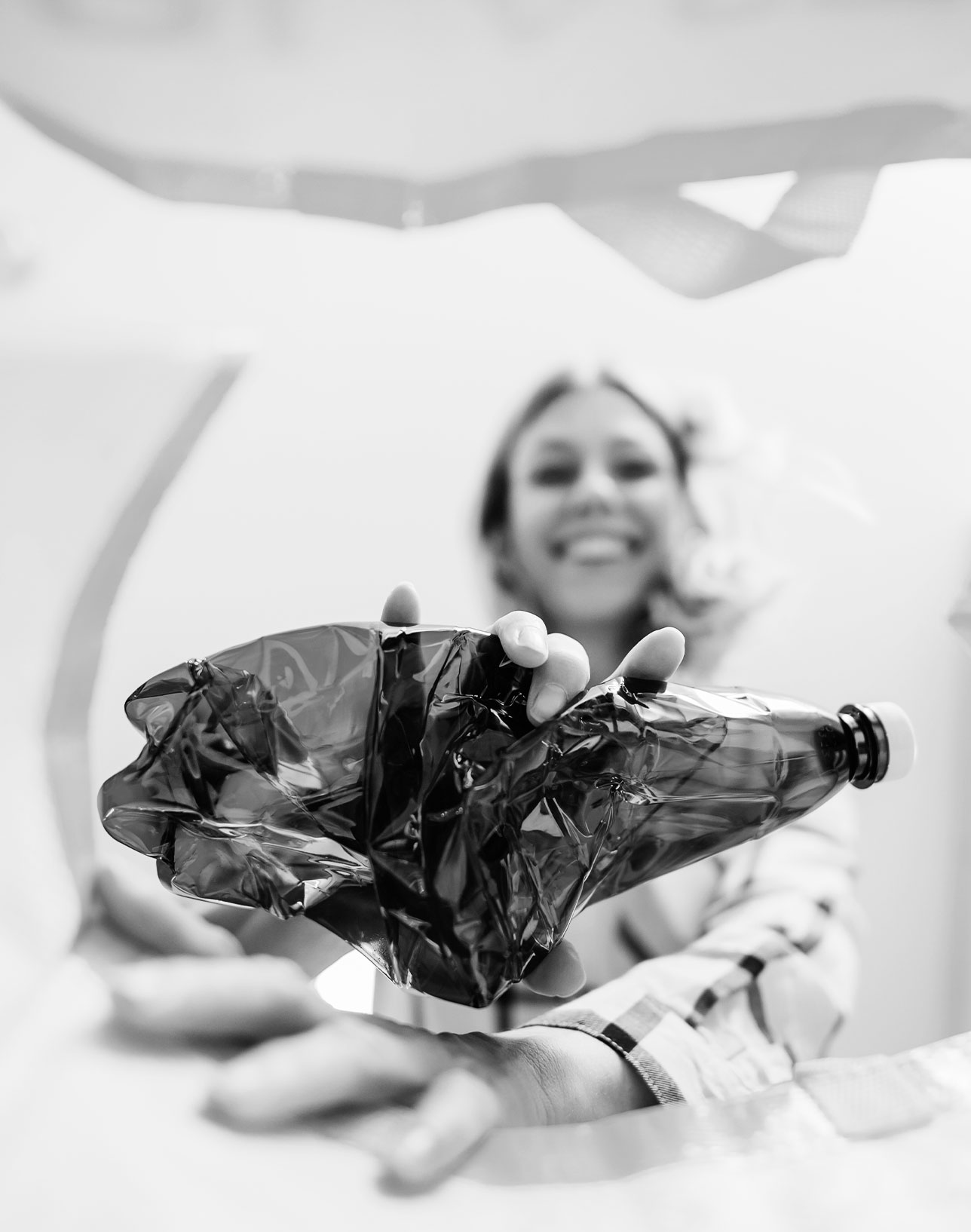LESSON PLAN

The Unplastify Challenge invites high school students across the world to explore the complex issue of plastic pollution by connecting emotionally with the topic, reflecting about their own relationship with the material, and inspiring them to get involved.
BENEFITS:
This lesson plan aligns with Global Competency standards, including:
Global Competence Assessment – PISA
Global competence is the capacity to: analyze global and intercultural issues critically and from multiple perspectives, to understand how differences affect perceptions, judgments, and ideas of self and others, and to engage in open, appropriate and effective interactions with others from different backgrounds on the basis of a shared respect for human dignity.
Knowledge
Skills
Attitudes
Global Competence – Asia Society, Center for Global Education
This lesson plan aligns with these Common Core Standards:
This lesson plan aligns with the International Baccalaureate focus and subjects.
International Baccalaureate Programme
The IB prepares students to succeed in a world where facts and fiction merge in the news, and where asking the right questions is a crucial skill that will allow them to flourish. The programmes focus on teaching students to think critically and independently, and how to inquire with care and logic.
Middle Years Programme 11-16 years (MYP)
The MYP aims to develop active learners and internationally minded young people who can empathize with others and pursue lives of purpose and meaning. The programme empowers students to inquire into a wide range of issues and ideas of significance locally, nationally and globally. The result is young people who are creative, critical and reflective thinkers.
Subject groups:
Diploma Programme 16-19 years (DP)
The DP aims to make students aware of the interpretative nature of knowledge, including personal ideological biases. It offers students and their teachers the opportunity to:
Participation in this process develops the capacity to analyze, synthesize and evaluate knowledge.
Subject groups:
Career-related Programme 16-19 years (CP)
The CP enables students to:
The issue of plastic pollution is a critical concern that demands urgent attention. Plastic production is increasing at an alarming rate, and if we continue on this trajectory, by 2050, there will be more plastics than fish in our oceans. The current waste management systems are failing us, with only 9% of discarded plastic being recycled. Shockingly, approximately 8 million metric tons of plastic find their way into the ocean each year (Jambeck, 2018).
The consequences of plastic pollution are far-reaching, impacting the health of our oceans, marine life, and even humans. Over 700 marine species have already been affected by plastic pollution (Nat Geo, 2018). Microplastics and microfibers have been found in species consumed directly by humans, including seafood and sea salt.
According to Unplastify, “the core of the plastic pollution problem lies in its misuse and overuse, not in the material itself. Relying solely on recycling is not enough; we need systemic prevention and a fundamental shift in our relationship with plastic.”
In this lesson, we will explore the severity of plastic pollution and its implications on the environment and all living beings. By empathizing with the challenges our planet faces, we can better understand the urgency of taking action to create a sustainable future for generations to come.
This lesson plan aligns with Global Competency standards, including:
Global Competence Assessment – PISA
Global competence is the capacity to: analyze global and intercultural issues critically and from multiple perspectives, to understand how differences affect perceptions, judgments, and ideas of self and others, and to engage in open, appropriate and effective interactions with others from different backgrounds on the basis of a shared respect for human dignity.
Knowledge
Skills
Attitudes
Global Competence – Asia Society, Center for Global Education
This lesson plan aligns with these Common Core Standards:
This lesson plan aligns with the International Baccalaureate focus and subjects.
International Baccalaureate Programme
The IB prepares students to succeed in a world where facts and fiction merge in the news, and where asking the right questions is a crucial skill that will allow them to flourish. The programmes focus on teaching students to think critically and independently, and how to inquire with care and logic.
Middle Years Programme 11-16 years (MYP)
The MYP aims to develop active learners and internationally minded young people who can empathize with others and pursue lives of purpose and meaning. The programme empowers students to inquire into a wide range of issues and ideas of significance locally, nationally and globally. The result is young people who are creative, critical and reflective thinkers.
Subject groups:
Diploma Programme 16-19 years (DP)
The DP aims to make students aware of the interpretative nature of knowledge, including personal ideological biases. It offers students and their teachers the opportunity to:
Participation in this process develops the capacity to analyze, synthesize and evaluate knowledge.
Subject groups:
Career-related Programme 16-19 years (CP)
The CP enables students to:
Now that you have learned about the severity of plastic pollution and its impact on the environment, it's time to take a closer look at the issue through thought-provoking documentaries. You will get to choose one of the following movies from the UNPLASTIFY Spotlight:
This lesson plan aligns with Global Competency standards, including:
Global Competence Assessment – PISA
Global competence is the capacity to: analyze global and intercultural issues critically and from multiple perspectives, to understand how differences affect perceptions, judgments, and ideas of self and others, and to engage in open, appropriate and effective interactions with others from different backgrounds on the basis of a shared respect for human dignity.
Knowledge
Skills
Attitudes
Global Competence – Asia Society, Center for Global Education
This lesson plan aligns with these Common Core Standards:
This lesson plan aligns with the International Baccalaureate focus and subjects.
International Baccalaureate Programme
The IB prepares students to succeed in a world where facts and fiction merge in the news, and where asking the right questions is a crucial skill that will allow them to flourish. The programmes focus on teaching students to think critically and independently, and how to inquire with care and logic.
Middle Years Programme 11-16 years (MYP)
The MYP aims to develop active learners and internationally minded young people who can empathize with others and pursue lives of purpose and meaning. The programme empowers students to inquire into a wide range of issues and ideas of significance locally, nationally and globally. The result is young people who are creative, critical and reflective thinkers.
Subject groups:
Diploma Programme 16-19 years (DP)
The DP aims to make students aware of the interpretative nature of knowledge, including personal ideological biases. It offers students and their teachers the opportunity to:
Participation in this process develops the capacity to analyze, synthesize and evaluate knowledge.
Subject groups:
Career-related Programme 16-19 years (CP)
The CP enables students to:
LEADER
MODERATOR
DEBATE DYNAMICS
What is your personal relationship with plastic? We'll explore our individual use of plastic and its impact on the environment. Let's take a moment to reflect on our daily interactions with plastic.
This lesson plan aligns with Global Competency standards, including:
Global Competence Assessment – PISA
Global competence is the capacity to: analyze global and intercultural issues critically and from multiple perspectives, to understand how differences affect perceptions, judgments, and ideas of self and others, and to engage in open, appropriate and effective interactions with others from different backgrounds on the basis of a shared respect for human dignity.
Knowledge
Skills
Attitudes
Global Competence – Asia Society, Center for Global Education
This lesson plan aligns with these Common Core Standards:
This lesson plan aligns with the International Baccalaureate focus and subjects.
International Baccalaureate Programme
The IB prepares students to succeed in a world where facts and fiction merge in the news, and where asking the right questions is a crucial skill that will allow them to flourish. The programmes focus on teaching students to think critically and independently, and how to inquire with care and logic.
Middle Years Programme 11-16 years (MYP)
The MYP aims to develop active learners and internationally minded young people who can empathize with others and pursue lives of purpose and meaning. The programme empowers students to inquire into a wide range of issues and ideas of significance locally, nationally and globally. The result is young people who are creative, critical and reflective thinkers.
Subject groups:
Diploma Programme 16-19 years (DP)
The DP aims to make students aware of the interpretative nature of knowledge, including personal ideological biases. It offers students and their teachers the opportunity to:
Participation in this process develops the capacity to analyze, synthesize and evaluate knowledge.
Subject groups:
Career-related Programme 16-19 years (CP)
The CP enables students to:
Students can use this worksheet to create their lists.
Now, let's brainstorm actions to collectively reduce single-use plastic usage. Make a personal commitment to stop using one single-use plastic item. Each of us can individually choose one single-use plastic item from our lists and make a personal commitment to stop using it. Set a realistic goal and timeline to gradually eliminate the chosen plastic item from your daily life.
What can we do collectively to change this? As a group, let's focus on eliminating single-use plastic from our school community. We can design a strategy to achieve this goal, focusing on communication, replacement, ban, or a combination of approaches.
This lesson plan aligns with Global Competency standards, including:
Global Competence Assessment – PISA
Global competence is the capacity to: analyze global and intercultural issues critically and from multiple perspectives, to understand how differences affect perceptions, judgments, and ideas of self and others, and to engage in open, appropriate and effective interactions with others from different backgrounds on the basis of a shared respect for human dignity.
Knowledge
Skills
Attitudes
Global Competence – Asia Society, Center for Global Education
This lesson plan aligns with these Common Core Standards:
This lesson plan aligns with the International Baccalaureate focus and subjects.
International Baccalaureate Programme
The IB prepares students to succeed in a world where facts and fiction merge in the news, and where asking the right questions is a crucial skill that will allow them to flourish. The programmes focus on teaching students to think critically and independently, and how to inquire with care and logic.
Middle Years Programme 11-16 years (MYP)
The MYP aims to develop active learners and internationally minded young people who can empathize with others and pursue lives of purpose and meaning. The programme empowers students to inquire into a wide range of issues and ideas of significance locally, nationally and globally. The result is young people who are creative, critical and reflective thinkers.
Subject groups:
Diploma Programme 16-19 years (DP)
The DP aims to make students aware of the interpretative nature of knowledge, including personal ideological biases. It offers students and their teachers the opportunity to:
Participation in this process develops the capacity to analyze, synthesize and evaluate knowledge.
Subject groups:
Career-related Programme 16-19 years (CP)
The CP enables students to:
By taking individual actions and working together as a group, we can make a positive impact on our environment and inspire others to join us on this journey towards a more sustainable future.
Let's lead by example and create a plastic-free school community together!
Duration
The timeline can range from two weeks to three months to allow ample time for research into the issue associated with the film’s topic, production and presentation.
Preparation
Review the resource links at the end of this lesson plan and familiarize yourself with the concepts.
Bonus Option
Want to take the learning further? If your students are between 15 and 16 years old, become their guiding educator and invite them to join the global Unplastify Challenge and lead collective action for good. Learn more at Unplastify.com
Last but not least: Apply for the SIMA Changemaker Award
Apply here. Applications close November 15 every year, winners are announced November 29. Rolling submissions!

Browse films from movies from the UNPLASTIFY Spotlight: